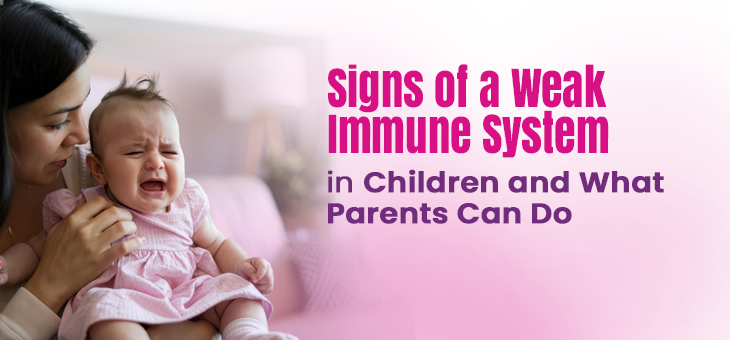Signs of a Weak Immune System in Children and What Parents Can Do
Introduction
Nothing would please us more as parents than to see our kids happy, healthy, and energetic. However, it's normal to be concerned if your child appears to be getting sick more frequently than usual or takes longer to get better. A strong immune system is essential for children to fight against illnesses, maintain their energy levels, and develop into healthy adults. The first step in making sure your child receives the attention and assistance they require is identifying the early warning signs of a weak immune system.
This blog will discuss how children's immunity develops, how to spot the symptoms of a weakened immune system, potential causes, and what parents can do to support their child's immune system. We'll also discuss the important role of maternity and fertility hospitals in Bangalore, as well as consultations with the best gynecologist in Bangalore, play in maternal wellness and early child health.
Immunity Development in Children
The immune system of a child takes time to fully mature. Immediately after birth, a baby begins to develop their defenses. The process starts with antibodies that are transferred from the placenta to breast milk, which has important immune-boosting qualities. A child's immune system gradually gets stronger as they are exposed to different settings, infections, and immunizations over time.
Children may, however, occasionally have compromised immunity for a variety of causes, from postnatal illnesses to mother health issues. Early detection and the right kind of intervention can make a big impact in these situations.
Why Early Detection Matters
Kids with weaker immune systems are not only more at risk for infections, but they also experience longer recovery times, more hospital stays, and occasionally severe medical conditions. By identifying these warning signs early on, parents can proactively collaborate with pediatricians and specialists to support the child's growth journey and fortify their natural defenses.
Common Signs of a Weak Immune System in Children
Although it's normal for children to get sick once in a while, recurring or regular illnesses could indicate something more serious.
1. Frequent Colds, Infections, or Fevers
A weakened immune system may be the cause of your child's recurrent ear, throat, or even skin infections, or if they get more than eight colds a year. Children who have weaker immune systems may heal more slowly from common diseases or get infections that come back quickly after treatment.
2. Digestive Problems
Immune function is significantly influenced by the gut. Children with weak immune systems may have constipation, diarrhea, or stomachaches on a regular basis. Their immune response may be further weakened by these digestive problems, which could affect their ability to absorb nutrients.
3. Slow Wound Healing
Does it take a long time for minor scrapes or bruises on your child to heal? That might indicate that their immune system isn't doing a good job of healing wounds and preventing potential infections.
4. Constant Fatigue or Sluggishness
Even after a full night's sleep, if your child feels exhausted all the time, it can be more than just laziness. An overworked or malfunctioning immune system may be the cause of low energy levels and a lack of enthusiasm for everyday tasks.
What Causes Weak Immunity in Kids?
There are a number of things that might affect a child's immune system, from birth to exposure to the environment.
Birth Factors
Premature or C-section babies could not have had as much time in the womb to build immunity, and they might not have received the good bacteria that comes with vaginal delivery. These kids frequently require additional immunological assistance in their early years.
Pregnant women who suffer from chronic illnesses or nutritional inadequacies may potentially give birth to children who have delayed development or weakened immunity. Through prenatal checkups and nutritional support during pregnancy, the maternity hospital in Bangalore can play a critical role in this situation.
Diet and Nutrition
A diet deficient in vital vitamins (such as zinc, A, C, and D) may make it more difficult for a child to fight infections. Lack of fruits and vegetables, processed snacks, and junk food damage gut health, which impacts immunity in general.
Environmental Exposure
Allergies and respiratory illnesses are more common in children who are frequently exposed to dirty environments, passive smoke, or polluted air. Over-sanitized environments, on the other hand, can also hinder immune training by reducing healthy exposure.
Role of Maternity and Fertility Hospitals in Child Health
The extent to which a mother's health during pregnancy affects a child's immunity is often unknown to parents. Under the careful supervision of skilled specialists, a well-managed pregnancy can help lower the chance of postpartum immunodeficiency.
Cambridge Hospital, one of the top maternity hospital in Bangalore, provide:
- Screenings during pregnancy to detect maternal weaknesses
- Postnatal care that guarantees kids receive the appropriate immunizations and nutritional evaluations
- Availability of pediatricians to help parents navigate early health milestones
Additionally, going to a fertility hospital in Bangalore can assist couples who are considering having a baby to increase their chances of a successful pregnancy. In order to help parents improve their nutritional profile, detect chronic diseases, and lower risks prior to conception, fertility specialists provide preconception counselling.
If there is a family history of immune-related problems, genetic counselling is another service that many fertility hospitals in Bangalore provide.
Consulting the Best Gynecologist in Bangalore
Sometimes maternal conditions that were neglected during pregnancy, like anemia, thyroid problems, or gestational diabetes, are the cause of a child's health problems.
Seeing the best gynecologist in Bangalore guarantees that the mother's health is monitored during her pregnancy.
- Both the mother and baby have optimal nutrient levels.
- For the long-term wellbeing of children, postnatal care and lactation guidance are available.
- Babies have a better start in life and have stronger immune systems from birth when their mothers are healthy.
Boosting Immunity: What Parents Can Do
Hospitals and specialists are important, but so are everyday lifestyle decisions made at home.
Balanced Diet
Your child should be encouraged to consume a variety of fruits and vegetables. Strong defenses are created by eating foods high in iron, protein, zinc, and vitamin C. Foods high in probiotics, such as yogurt or curd, can also help to strengthen the gut.
Good Sleep & Regular Exercise
Children's bodies require a minimum of 10 to 12 hours of peaceful sleep in order to heal and recover. Encourage outdoor play, which boosts health and strengthens the immune system through exercise.
Hygiene Habits
Educate your child in the fundamentals of good hygiene, such as protecting their mouth while sneezing, brushing twice a day, and washing their hands before eating. Although immune development requires exposure to pathogens, maintaining proper cleanliness lowers the probability of recurring infections.
Conclusion:
The secret to a child's happy and healthy development is a strong immune system. Don't brush off symptoms like recurrent sickness, delayed recovery, or persistent fatigue as "just a phase." These can be significant indicators that your child requires lifestyle aid or medical care.
Cambridge Hospital will assist you whether you are planning for a newborn, are expecting a child, or raising a toddler. We provide complete care for moms and kids, beginning before delivery and extending until early childhood, as a reputable maternity and fertility hospital in Bangalore.
Take proactive measures to ensure your family's long-term health by scheduling a pediatric or maternity consultation right now.


